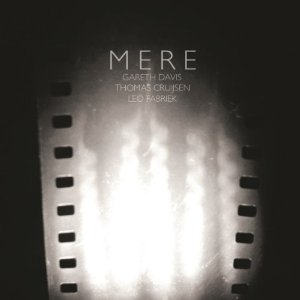Mere’s debut album is a beauty, and it also has the added, wonderful, benefit of allowing this lucky scribe the chance to talk rapturously about a lost gem of 70s rock: A Meditation Mass by mostly-forgotten kosmische band Yatha Sidhra. For Mere taps straight into the same vein of mystical, transcendent, typical psychedelic rock that Yatha Sidhra, perhaps more than any other band of their day bar Ash Ra Tempel, encapsulated most perfectly. It’s just such a shame they only released one album.
Luckily, somehow (for I do not know how aware they are of their German forebears), Mere, a trio formed of Gareth Davis, Thomas Cruijsen and Leo Fabriek, channels exactly the same essence of elegant, considered psychedelia, albeit while also filtering Yatha Sidhra’s dreamy, definitely hippy, attitude through the subsequent forty-odd years’ worth of modern rock/fusion history. A Meditation Mass was built on the interaction between rock and jazz-based rhythm, "progressive" song structures and use of synths, and the flights of fancy conjured up by flute and other woodwinds. With Mere, this is mirrored as Gareth Davis’ bass clarinet becomes a sophisticated, eloquent counterpoint to the brittle guitar and drum interplay of Cruijsen and Fabriek, its fluid, loping jazz notes slaloming between precise polyrhythms and brittle arpeggios on electric guitar. Initially calm, with a pace akin to the most leisurely of Soft Machine pieces, as the track gathers pace the interplay between all three becomes more precarious, but paradoxically more elaborate, the notes scattered around by Cruijsen being picked up and propelled skywards by Fabriek’s measured percussive drives, while Davis peppers the spaces in-between with increasingly strident, almost free-jazz squalls and screams. The resemblance to Yatha Sidhra (and even, at the track’s most enervated moments, to Ash Ra Tempel), hits its apex as the track gallops to a close, and you may find yourself reaching for the Rizlas and wacky baccie just to enhance the wildness of the experience.
And wild is a good word for the music of Mere, despite my comparisons to the more leisurely Yatha Sidhra. It’s more that the Germans’ folky-psych approach to fusion is used by the current trio as a solid base from which to launch themselves into more daunting, and vigorous, territory. This considered modernisation of the kosmische sound sees the trio toying with avant-garde noises and free improv on ‘II’, while the third piece is a twenty-minute romp that picks the basis of ‘I’ up and builds it into a rampaging jam, on which, after another quiet, gradual build-up, Gareth Davis unleashes a tornado of rambunctious power notes whilst Cruijsen rips at the strings on his guitar and Leo Fabriek goes all early Klaus Schulze on us with a thundering of the toms that sounds like a genius octopus using all eight legs to maximum effect.
Like many a German band of the early 70s, Mere have even gone for this side-long jam. In an age where looking back into the past has become the norm, to the point where even new age is deemed suitable mining material, such a clear stylistic and conceptual nod to kosmische does not seem as "retro" as it might have done a few years ago, especially as Fabriek, Cruijsen and Davis are so adept and sliding different textures into their trippy sonic tapestry. Equally, to use a football cliche, class is very much permanent. Yatha Sidhra were of their time and out of it all at once, which is what made their album so enduringly interesting. Same goes for Ash Ra Tempel, Sergius Golowin and the first Tangerine Dream album, all of which have echoes in Mere’s oddball slab of mood-driven jazz-rock. These three guys are in good company, regardless of the separating decades, and I am ready to bet that Mere will long hold the same timeless appeal.


